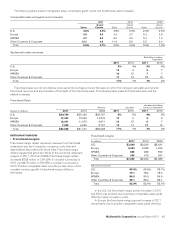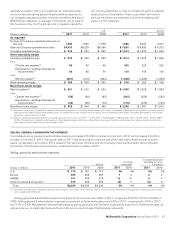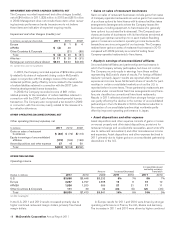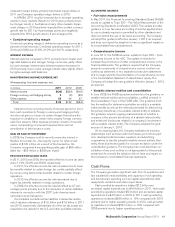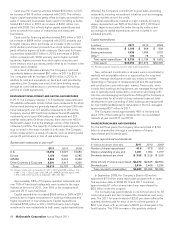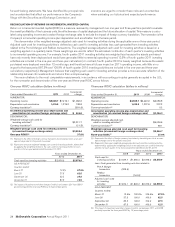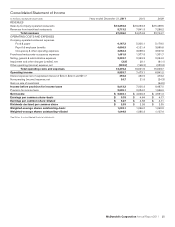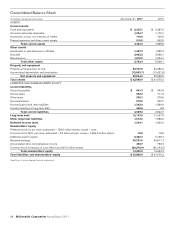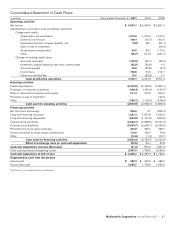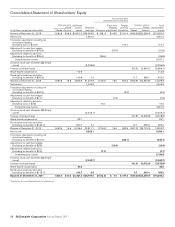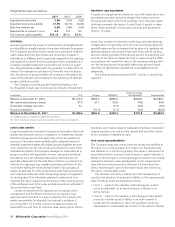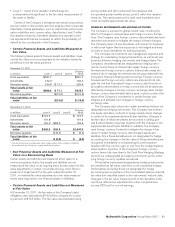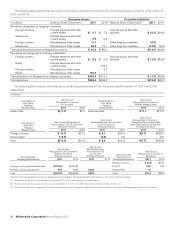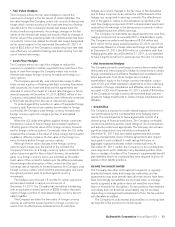McDonalds 2011 Annual Report Download - page 25
Download and view the complete annual report
Please find page 25 of the 2011 McDonalds annual report below. You can navigate through the pages in the report by either clicking on the pages listed below, or by using the keyword search tool below to find specific information within the annual report.similar assets, taking into account anticipated technological or
other changes. The Company periodically reviews these lives rela-
tive to physical factors, economic factors and industry trends. If
there are changes in the planned use of property and equipment,
or if technological changes occur more rapidly than anticipated,
the useful lives assigned to these assets may need to be short-
ened, resulting in the accelerated recognition of depreciation and
amortization expense or write-offs in future periods.
• Share-based compensation
The Company has a share-based compensation plan which
authorizes the granting of various equity-based incentives includ-
ing stock options and restricted stock units (RSUs) to employees
and nonemployee directors. The expense for these equity-based
incentives is based on their fair value at date of grant and gen-
erally amortized over their vesting period.
The fair value of each stock option granted is estimated on
the date of grant using a closed-form pricing model. The pricing
model requires assumptions, which impact the assumed fair val-
ue, including the expected life of the stock option, the risk-free
interest rate, expected volatility of the Company’s stock over the
expected life and the expected dividend yield. The Company uses
historical data to determine these assumptions and if these
assumptions change significantly for future grants, share-based
compensation expense will fluctuate in future years. The fair
value of each RSU granted is equal to the market price of the
Company’s stock at date of grant less the present value of
expected dividends over the vesting period.
• Long-lived assets impairment review
Long-lived assets (including goodwill) are reviewed for impair-
ment annually in the fourth quarter and whenever events or
changes in circumstances indicate that the carrying amount of an
asset may not be recoverable. In assessing the recoverability of
the Company’s long-lived assets, the Company considers
changes in economic conditions and makes assumptions regard-
ing estimated future cash flows and other factors. Estimates of
future cash flows are highly subjective judgments based on the
Company’s experience and knowledge of its operations. These
estimates can be significantly impacted by many factors including
changes in global and local business and economic conditions,
operating costs, inflation, competition, and consumer and demo-
graphic trends. A key assumption impacting estimated future
cash flows is the estimated change in comparable sales. If the
Company’s estimates or underlying assumptions change in the
future, the Company may be required to record impairment
charges. Based on the annual goodwill impairment test, con-
ducted in the fourth quarter, the Company does not have any
reporting units (defined as each individual country) with goodwill
currently at risk of impairment.
• Litigation accruals
In the ordinary course of business, the Company is subject to
proceedings, lawsuits and other claims primarily related to com-
petitors, customers, employees, franchisees, government
agencies, intellectual property, shareholders and suppliers. The
Company is required to assess the likelihood of any adverse
judgments or outcomes to these matters as well as potential
ranges of probable losses. A determination of the amount of
accrual required, if any, for these contingencies is made after
careful analysis of each matter. The required accrual may change
in the future due to new developments in each matter or changes
in approach such as a change in settlement strategy in dealing
with these matters. The Company does not believe that any such
matter currently being reviewed will have a material adverse
effect on its financial condition or results of operations.
• Income taxes
The Company records a valuation allowance to reduce its
deferred tax assets if it is more likely than not that some portion
or all of the deferred assets will not be realized. While the Com-
pany has considered future taxable income and ongoing prudent
and feasible tax strategies, including the sale of appreciated
assets, in assessing the need for the valuation allowance, if these
estimates and assumptions change in the future, the Company
may be required to adjust its valuation allowance. This could
result in a charge to, or an increase in, income in the period such
determination is made.
The Company operates within multiple taxing jurisdictions and
is subject to audit in these jurisdictions. The Company records
accruals for the estimated outcomes of these audits, and the
accruals may change in the future due to new developments in
each matter. In 2010, the Internal Revenue Service (IRS) con-
cluded its field examination of the Company’s U.S. federal income
tax returns for 2007 and 2008. In connection with this examina-
tion, the Company received notices of proposed adjustments
from the IRS related to certain foreign tax credits of about
$400 million, excluding interest and potential penalties. The
Company disagrees with the IRS’ proposed adjustments. The
Company has filed a protest with the IRS Appeals Office and
expects resolution on this issue in 2012. The Company does not
believe that the resolution will have a material impact on its
results of operations or cash flows. The Company’s 2009 and
2010 U.S. federal income tax returns are currently under exami-
nation and the completion of the examination is expected
in 2013.
Deferred U.S. income taxes have not been recorded for
temporary differences totaling $12.6 billion related to invest-
ments in certain foreign subsidiaries and corporate affiliates. The
temporary differences consist primarily of undistributed earnings
that are considered permanently invested in operations outside
the U.S. If management’s intentions change in the future,
deferred taxes may need to be provided.
EFFECTS OF CHANGING PRICES—INFLATION
The Company has demonstrated an ability to manage inflationary
cost increases effectively. This ability is because of rapid
inventory turnover, the ability to adjust menu prices, cost controls
and substantial property holdings, many of which are at fixed
costs and partly financed by debt made less expensive by
inflation.
RISK FACTORS AND CAUTIONARY STATEMENT ABOUT
FORWARD-LOOKING INFORMATION
This report includes forward-looking statements about our plans
and future performance, including those under Outlook for 2012.
These statements use such words as “may,” “will,” “expect,”
“believe” and “plan.” They reflect our expectations and speak only
as of the date of this report. We do not undertake to update
them. Our expectations (or the underlying assumptions) may
change or not be realized, and you should not rely unduly on
McDonald’s Corporation Annual Report 2011 23




